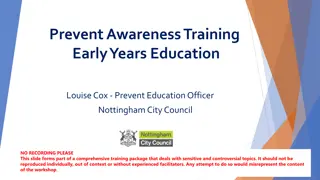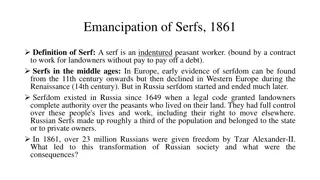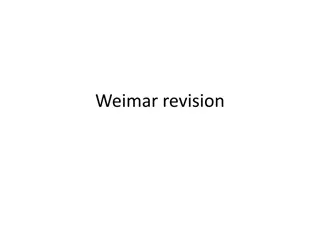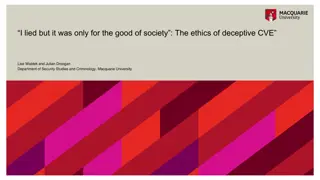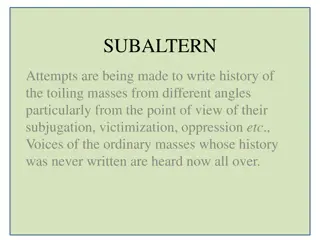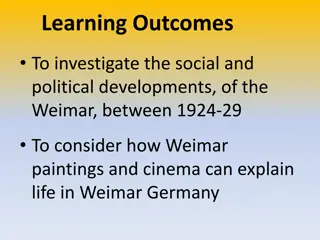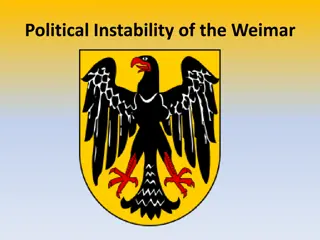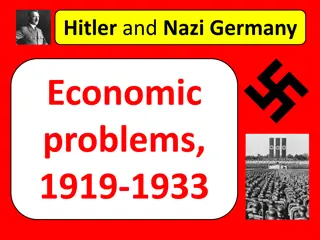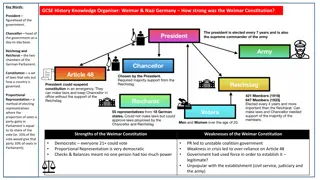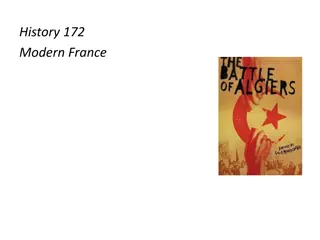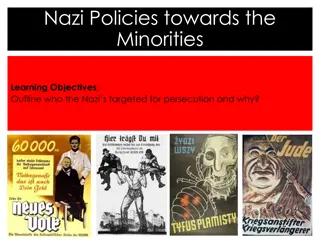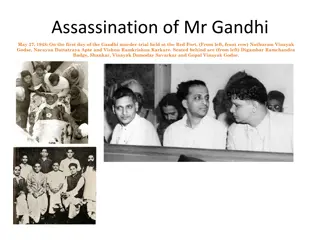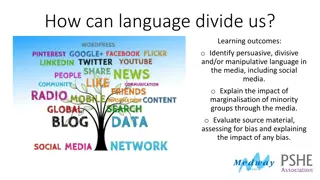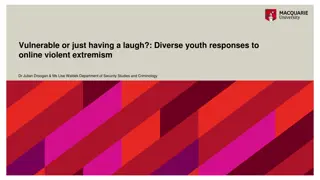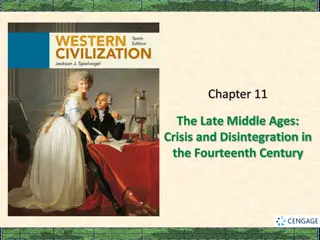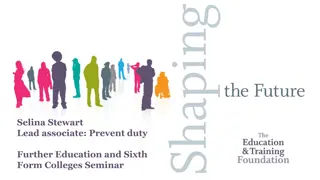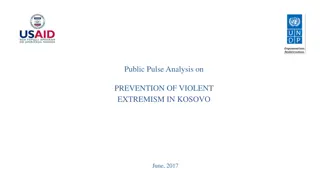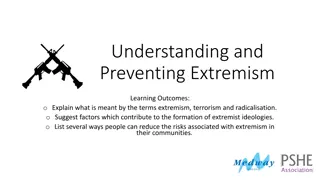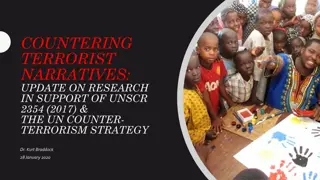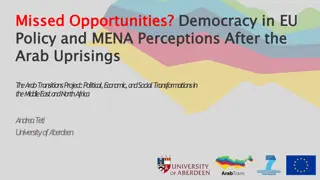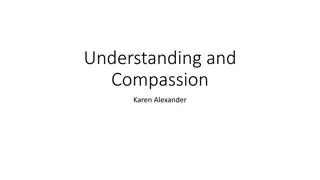Status of Family Laws in India: Hindu vs. Religious Minorities
The family and personal status laws in India vary between Hindu law and those pertaining to religious minorities. While Hindu law has seen extensive reforms, discriminatory provisions still exist. In contrast, laws governing religious minorities have undergone fewer reforms, leading to greater inequ
2 views • 4 slides
Prevent Duty Training for Early Years Education Professionals
The Prevent Duty Training for Early Years Education Professionals aims to provide crucial information on the Prevent Duty and responsibilities outlined in KCSIE 2023. The training covers key aspects such as local risk factors, extremist groups affecting youth, recognizing signs of vulnerability in c
1 views • 30 slides
Emancipation of Serfs in Russia: Causes and Consequences
The Emancipation of Serfs in Russia in 1861 marked a significant transformation in society. Influenced by various factors such as the Crimean War, pressure from nobles and intellectuals, growing peasant uprisings, and economic motives, Tsar Alexander II abolished serfdom. This decision aimed to alle
3 views • 11 slides
Understanding the Challenges Faced by the Weimar Republic
This compilation of sources delves into the various problems encountered by the Weimar Republic, such as food shortages, political uprisings, economic instability, and currency devaluation. It discusses the threats from both the Left and the Right, shedding light on the turmoil and crises faced by t
0 views • 23 slides
Deceptive CVE Strategies and Ethical Considerations in Countering Violent Extremism
Exploring the complexities of implementing online CVE programs to divert youth from violent extremist narratives, this article discusses the use of counter-narratives, ethical challenges of deception, and the importance of reflexivity in program design and implementation.
0 views • 13 slides
Critical Thinking in Islamic Methodology
Explore the concept of critical thinking in Islam, identifying key skills and understanding the importance of constructive criticism. Delve into the methodology of thinking in Islam that transcends superficial understanding, enabling individuals to distinguish between good and bad, correct and incor
2 views • 12 slides
Rediscovering Subaltern Voices: History of the Toiling Masses
Efforts are underway to document the history of marginalized communities and highlight their struggles against oppression and injustice throughout time. From ancient Roman slaves to modern-day indigenous uprisings, the voices of the subaltern are being brought to light. Scholars are recognizing the
0 views • 17 slides
Social and Political Developments in Weimar Germany (1924-1929)
The period between 1924 and 1929 in Weimar Germany witnessed greater political stability with the Social Democrats winning most of the votes, although they did not secure a majority. The election results show a decline in support for extremist groups like the Communists and Nazis. Factors contributi
1 views • 29 slides
Political Instability of the Weimar Republic: Spartacist and Kapp Putsches
The Weimar Republic faced political instability due to uprisings like the Spartacist and Kapp Putsches, rooted in dissatisfaction with its surrender to the Allies, weak constitution, and failure to address food shortages. The Spartacist Rising of January 1919, led by figures like Karl Liebknecht and
3 views • 18 slides
Economic Crises Faced by Weimar Republic, 1919-1933
The Weimar Republic encountered significant economic challenges between 1919 and 1933, leading to chaos and a surge in extremist support. Major crises included hyperinflation in 1923 and the devastating global Depression starting in 1929. The Treaty of Versailles imposed reparations on Germany, whic
0 views • 24 slides
Challenges Faced by the Weimar Republic in Germany
The Weimar Republic in Germany faced various challenges between 1919 and 1923, including political polarisation, extremist uprisings from both left-wing and right-wing groups such as the Spartacists and Freikorps, economic struggles like hyperinflation, and constant fighting undermining its authorit
0 views • 13 slides
The Algerian War and Decolonization in Modern France
The Algerian War of Independence (1954-1962) marked a significant chapter in modern French history, leading to the decolonization of Algeria. The conflict involved brutal tactics, mass expropriations, and human rights violations, as France sought to exploit Algeria for economic gain. The rule over A
6 views • 34 slides
Nazi Persecution of Minorities: Targets and Rationale
The Nazis targeted various groups for persecution, believing in a racial hierarchy where certain races were deemed inferior. They aimed to eliminate those they considered undesirable, including Gypsies, black people, the mentally disabled, homosexuals, and more. The Nazis' actions were driven by the
7 views • 12 slides
The Assassination of Mahatma Gandhi and the Trial of the Conspirators
The assassination of Mahatma Gandhi on January 30, 1948, by a young Hindu extremist sent shockwaves through India. The trial of the accused conspirators, including Nathuram Godse and Narayan Apte, resulted in eight convictions, with Godse and Apte being hanged for the murder. The incident marked a t
0 views • 11 slides
The Impact of John Brown's Raid on Harper's Ferry in 1859
John Brown's raid on Harper's Ferry in 1859 was an attempt to incite a slave rebellion and abolish slavery. Brown believed in the righteousness of his cause, but his actions sparked national debate and differing reactions. While some saw him as a martyr for freedom, others viewed him as a radical ex
2 views • 9 slides
The Berlin Revolutions of 1848: A Historic Perspective
The Berlin Revolutions of 1848 were part of a series of widespread uprisings across Europe, driven by a mix of liberal and working-class goals. The revolutions aimed to challenge the existing autocratic political structure in the German Confederation and the Austrian Empire. Despite initial hopes fo
1 views • 14 slides
Understanding Language Division in Media Representations
Explore the impact of language in media on marginalization, bias, and divisive perspectives towards minority groups. Reflect on the portrayal of different groups such as teenagers, city bankers, and migrants, and consider how language influences societal divisions and extremist views. Evaluate the r
1 views • 21 slides
Understanding Youth Responses to Online Violent Extremism
Diverse youth responses to online violent extremism are explored in this research, aiming to understand how and why young audiences consume and produce such content. The study delves into how young people define and engage with online violent extremist content, shedding light on their emotional and
0 views • 13 slides
The Late Middle Ages: Crisis and Disintegration in the Fourteenth Century
The fourteenth century in Europe was marked by the devastating impact of the Black Death, economic dislocation, social upheaval, and political instability. The bubonic plague wiped out a significant portion of the population, leading to labor shortages and peasant uprisings. The decline of the papac
1 views • 24 slides
PREVENT Strategy Implementation in Sheffield Schools: Autumn/Winter 2015-16
Raising awareness of the PREVENT strategy in Sheffield schools during the Autumn/Winter term of 2015-16 is crucial for safeguarding and preventing individuals from supporting terrorism. The strategy emphasizes the duty of schools to address all forms of terrorism through various initiatives like wor
0 views • 16 slides
Understanding the Prevent Duty in Further Education and Sixth Form Colleges
The Prevent Duty is a statutory responsibility that applies to various education providers, including those not receiving public funding. It involves safeguarding learners against extremist influences, necessitating risk assessments, clear policies, and staff training. Exploiting vulnerable individu
0 views • 20 slides
Public Pulse Analysis on Prevention of Violent Extremism in Kosovo
Public Pulse Analysis in June 2017 delves into Kosovans' perceptions of violent extremism, resilience of Kosovan society against extremist ideologies, and strategies for increasing resilience through institutional efforts. The study begins with an overview of citizen perceptions from previous years,
0 views • 16 slides
Understanding and Preventing Extremism: Factors, Risks, and Solutions
Explore the definitions of extremism and terrorism, factors contributing to extremist ideologies, ways to reduce risks associated with extremism, and key concepts to understand and prevent radicalization. Delve into the root causes of extremist activities, such as lack of identity, influence from vi
0 views • 12 slides
Advancing Counterterrorism Strategies: Research Updates and Evaluation Methods
Recent research and developments in countering terrorist narratives highlight efforts spanning from pre-radicalization to disengagement phases, emphasizing interventions to challenge extremist ideologies and promote critical thinking. Evaluation tools and recommendations, including the use of quasi-
0 views • 8 slides
Perceptions and Policy Choices in EU-MENA Relations
Explore the intricacies of EU-MENA relations post-Arab uprisings, focusing on missed opportunities, democracy perceptions, policy frameworks, and social transformations in the region. Delve into the evolution of EU policies pre- and post-uprisings, analyzing the role of democracy, human rights, and
0 views • 19 slides
The Intriguing Life of Mary, Queen of Scots
Mary, Queen of Scots, posed a significant threat to Elizabeth I due to her claim to the English throne, turbulent marriages, and religious conflicts. Despite facing challenges such as Protestant uprisings and controversial marriages, Mary's tumultuous life ultimately led to her imprisonment and plea
0 views • 11 slides
Understanding Extremist Risks: Insights and Strategies
Explore the complexities of extremist risk through a lens of psychological and contextual analysis. Delve into the nature of terrorism, different types of terrorism, and the importance of robust risk assessment in preventing, pursuing, protecting, and preparing against terrorist activities.
0 views • 21 slides
Colonial Rebellions and Reactions in Early America
The Colonial Rebellions in early America, such as Bacon's Rebellion and the Stono Rebellion, exemplified the growing tensions and conflicts within the colonial society. These uprisings highlighted issues of class struggle, disparity in social status, and led to significant consequences such as the f
0 views • 7 slides
Understanding Social Progress and Terrorism: Factors and Solutions
Exploring the socio-economic factors contributing to terrorism and hindering social progress, this content delves into the correlation between unemployment, state repression, violence, and terrorism. Key factors analyzed include weak state capacity, corruption, extremist ideologies, and social injus
0 views • 15 slides
Rabindranath Tagore: The Iconic Man of Letters and His Political Stand
Rabindranath Tagore, the Nobel Prize-winning poet, novelist, and painter, was a modernist humanist who criticized extremist nationalism. He founded Viswa Bharati University as a radical educational experiment. The context of his time, including the Jallianwala Bagh Massacre and the Swadeshi Movement
0 views • 15 slides

